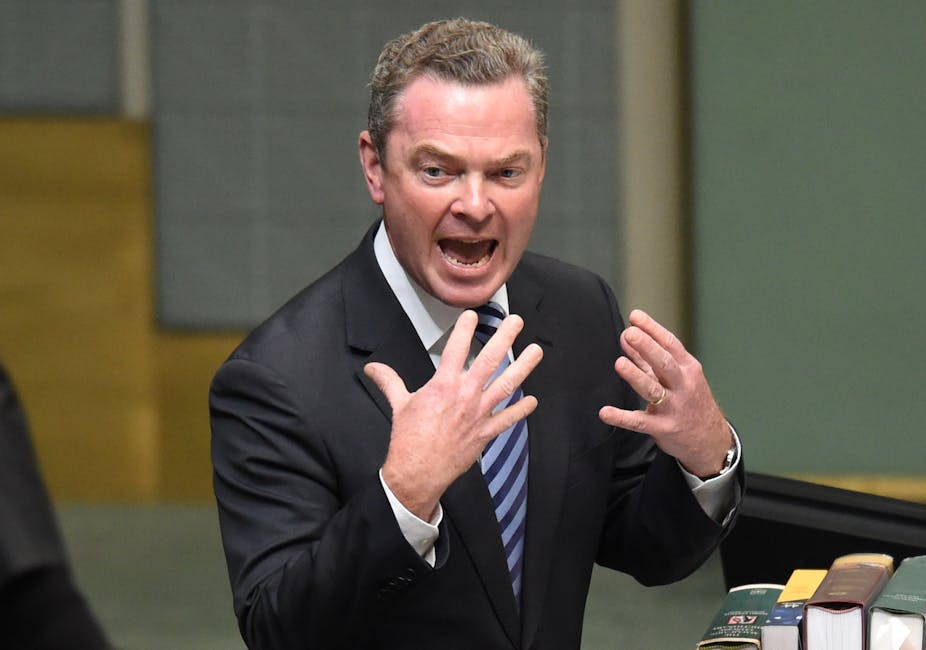The government appears set this week for another Senate rejection of its plan to deregulate university fees. And it can’t just blame a difficult crossbench. It has botched the process, and is now using the most provocative arm-twisting.
Ahead of the debate, due to start Monday and come to a vote Wednesday, three crossbench opponents of the plan – independents Jacqui Lambie and Glenn Lazarus (both ex-PUPs), and Nick Xenophon – lashed out at the government over its tactics.
Lambie, who’d initially said she’d not be present for the vote because she was recovering from a back operation (although she’d be “paired” with an MP supporting the legislation), announced she’d ask doctors for an early release so she could be on the spot.
Lambie was outraged when Education Minister Christopher Pyne on Sunday repeated his threat that if the legislation goes down, A$150 million planned funding for scientific research, involving 1700 jobs, won’t go ahead. Lambie said this made her blood boil, accusing Pyne of a “juvenile and bumbling attempt to blackmail” crossbench senators.
Lazarus, who quit the Palmer United Party last week, condemned the government for “appalling ethics” over its threat, and said he wasn’t prepared to horse trade on the legislation. Nor would he meet Pyne, a position he adopted before the Senate’s initial defeat of the reforms last year.
Xenophon accused the government of holding the scientists “hostage”.
Only three of the eight (non-Green) crossbenchers are needed to defeat the university reforms, which are opposed by Labor and the Greens. The one remaining PUP senator, Dio Wang, reaffirmed his opposition on Friday (even though he is considered personally sympathetic).
Xenophon has put forward what seems a sensible compromise. He would agree to allowing a modest fee rise on a one-off basis, ahead of an independent review of university funding. But the government hasn’t been interested, he says.
Pyne said on Sunday everything is on the table – the package includes also a 20% cut in funding – “except the centrepiece of the reform which is deregulation”. He indicated the government was willing to look at a proposal from Australian National University academic Bruce Chapman, father of the HECS scheme brought in by Labor, for a mechanism that would impose financial disincentives on substantial fee rises.
Pyne’s threat to the money for the National Collaborative Research Infrastructure Strategy, which funds facilities providing services to other scientific researchers, seems an extraordinarily crude way of trying to win crossbench votes.
First, the crossbenchers are obviously alienated by such heavy-handedness.
Second, it has only opened another, broader front of attack on the government. The vice-chancellors of the elite Go8 universities called it “dumb” in an advertisement in newspapers last week. The Business Council of Australia has condemned it.
Third, assuming the universities package goes down, the government will be faced with having to go through with the threat or making a retreat – the first course bringing deep pain; the second, considerable embarrassment.
Labor plans to move a motion (which would be a political statement without substantive effect) demanding the research funding be paid immediately. It is co-sponsored by the Greens, Lambie, Lazarus, Xenophon, Wang, John Madigan and Ricky Muir (Motoring Enthusiast Party), and would be voted on before the higher education package.
The ill-judged threat was just the latest bad step in a flawed government approach in pushing for its universities plan.
The first was that the Coalition did not flag any such plan before the election. Tony Abbott indeed suggested he had no major changes in mind for universities. In a speech on higher education in 2013, he promised to lead a consultative government. “We understand the value of stability and certainty, even to universities.”
After the election, Pyne commissioned a report, done by former Coalition education minister David Kemp and Andrew Norton from the Grattan Institute (who’d previously worked for Kemp in government), on the demand-driven system that Labor had brought in. The inquiry had relatively narrow terms of reference. The report mentioned deregulation but did not recommend it.
Pyne kept his counsel although he did give a hint of big change shortly before the 2014 budget when he said the Coalition would continue to take steps to challenge higher education providers “to map out their futures according to their strengths”.
But when the plan was unveiled in the budget the groundwork hadn’t been done.
If the government had been more upfront before the election, and then had a broad inquiry and a consultative process, it would have both given itself a better chance of carrying reform and avoided some of the voter backlash.
If this legislation is lost, the debacle will made worse for the government by it having bungled the process – just as it did with the Medicare co-payment, which it recently dropped.
In general, the Abbott government simply does not understand the importance of proper “process”.
It is true the higher education plan has support from almost all vice-chancellors – those from richer universities have a good deal to gain; others believe that they have no alternative given the financial squeeze they face. But it doesn’t have public backing.
Incidentally, if it is rejected this week, the legislation doesn’t fall in the double dissolution category because it is different in detail to that rejected last year. It would have to be defeated twice in the same form. Not that it would be anything but a negative in any election campaign.

